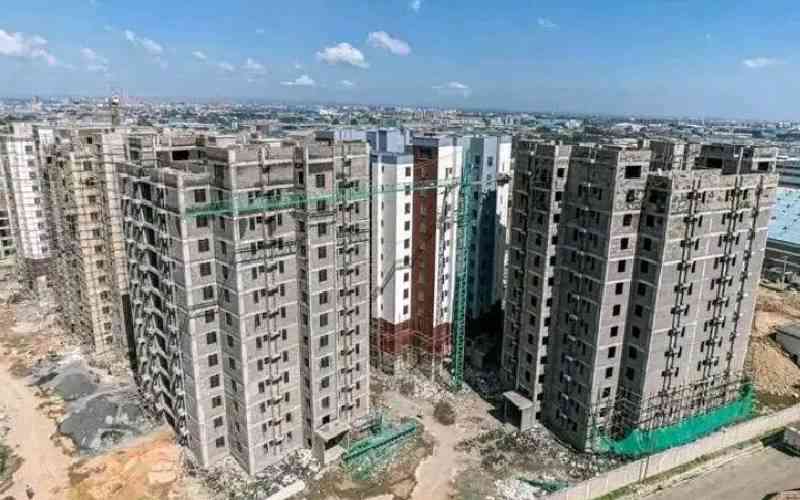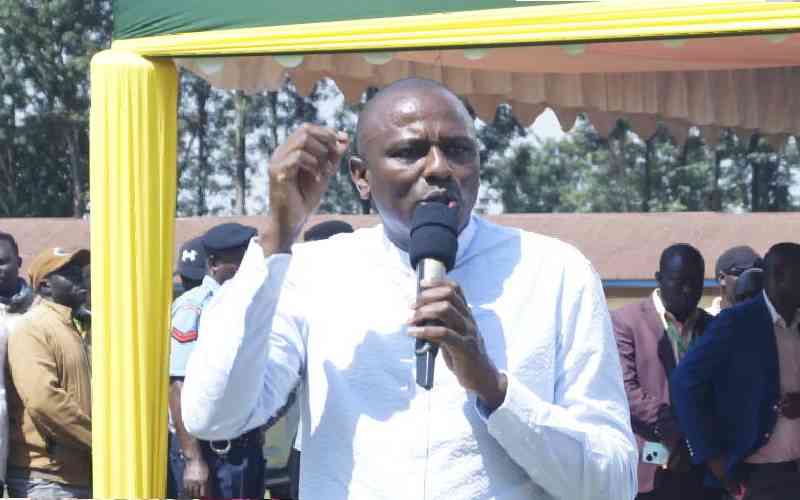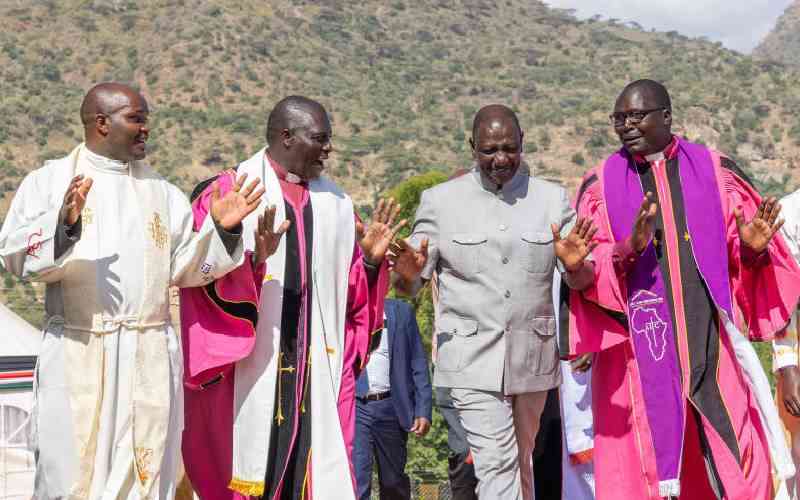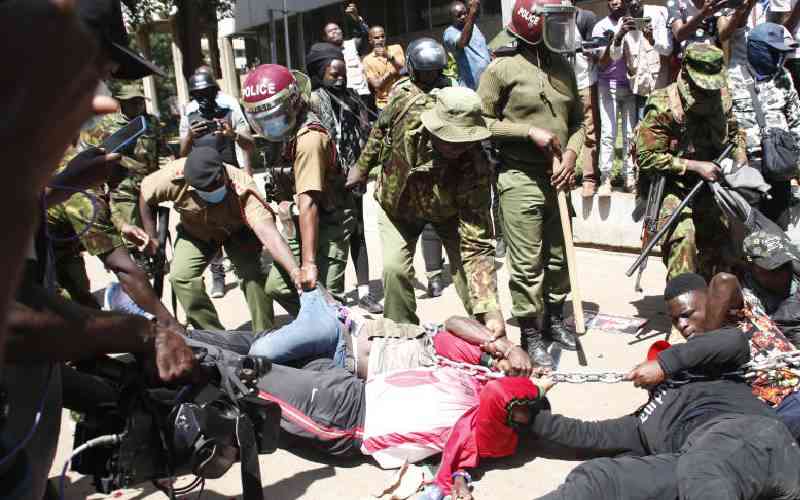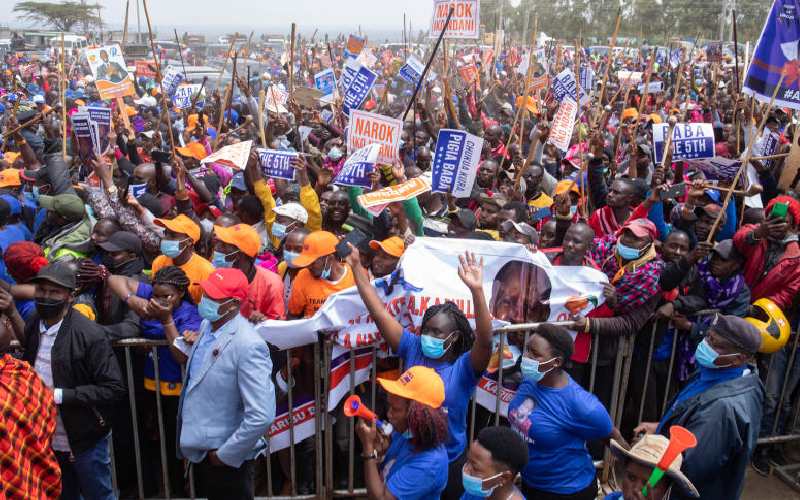
Supporters of ODM leader Raila Odinga in Ololunga Narok County. [Emmanuel Wanson]
Listening to political discourse in my neck of the woods as well as nationally, and in considering prevalent ideas about how to develop Laikipia, and rural Kenya, I can distil some frame of reference. But first a disclaimer. They are not documented theories. Rather, what follows here is my own interpretation of what politicians are saying.
I shall call these frames of reference theories, and proceed to name them as the commanding heights theory, education and empowerment, support to MSMEs, urbanisation, irrigated agriculture, economic blocks and corridor development, and finally, politicians as patrons theory.
Commanding heights theory was, in undergraduate economics, sometimes associated with Mwalimu Julius Nyerere. The theory holds that the way government can transform a rural economy is by controlling the commanding heights of that economy.
Those politicians who are promising special economic zones appear to be using this theory. As do those who propose selected investments in what are expected to be transformative enterprises. It encounters difficulty in practice because most governments are not good at business. A now discredited strategy of overcoming this deficiency was to find management and technical partners who could then run the businesses that government established with them.
Pan African Paper Mills in Webuye is a classic example of what could go wrong. The management made piles of money for three decades then simply walked away. They left an aging plant, millions of dollars in debt, and a population angry at the loss of jobs.
The tertiary education as the driver of social mobility theory is based on the idea of society attaining a critical mass of the middle class, in order to provide a sufficient market for manufacturing industries to emerge. It is based on the view that education is the key driver of social mobility and that almost all those who have attained tertiary education are in the middle class.
This was the idea behind President Mwai Kibaki’s expansion of university education, and President Uhuru Kenyatta’s massive expansion of tertiary colleges, particularly the technical training institutes.
Like all policy, it has suffered some setbacks. Technical and vocational education and training institutions (TVETs) have not gained legitimacy and suffer from a poor image associated with technical education. With a few exceptions such as Dedan Kimathi University of Technology, institutions of higher learning have not been able to meaningfully engage with counties and industry.
We Kenyans like to lament that we were left behind by South Korea and Singapore yet we were at the same level of development in the 60s. One of the reasons we lag behind is tertiary education attainment. In South Korea, 70 per cent of the population has post-secondary education. In comparison, we are at 10.6 per cent in our beloved republic!
A closely related theory is the one on human empowerment and defeating the negative sentiment. This is one of my favourite theories and holds that individuals, once freed from negative sentiment, will generally on their own motion, transform their lives. The purpose of policy therefore is to free individuals from that negative sentiment, and to provide a supportive environment. In Laikipia, for example, we hold small business training in high regard. Another favourite of mine is massive support of micro- and small-scale manufacturing. This theory holds that there is no country on earth that has gotten rich without manufacturing. The purpose of government therefore is to provide massive support to manufacturing micro- and small-scale businesses, including protection from industries in other countries.
This theory throws away the Ricardian ideas of free trade, arguing that rich countries got rich through protecting their own manufacturing. It calls for the overthrow of the Washington consensus, and recognises that free markets are rare.
In fact, if you are not careful, and you have free trade between a manufacturing country and other producing raw materials, the latter will specialise in being poor!
In pursuit of the policy, we in Laikipia are supporting over 1,600 micro- and small-scale manufacturing and processing businesses with business development services.
On the finance side, we have organised a market-based stimulus programme that is providing Sh4 billion in local purchase order (LPO) finance, invoice discounting and working capital. These efforts have yielded a doubling of the business register to 25,000 MSMEs, and 19,000 new jobs. Organised urbanisation and smart towns theory holds that investments in infrastructure in small market centres and towns can be the basis of increased commercial activity, including manufacturing and processing of agricultural produce. This strategy has been embraced by Laikipia County and Italy with some success.
Such transformation is taking place in Oljabet, Kinamba, Sipili and Rumuruti in Laikipia. The early success has prompted my government to seek the National Treasury and Intergovernmental Budget and Economic Council (IBEC) approval to issue a Sh1 billion infrastructure bond, so that we can improve another 10 towns. Some opponents of this strategy say that we should just focus on agriculture, and improving the larger towns.
Water for production & diversified agriculture: A not so recent idea is providing water for production, to drive irrigated agriculture. This strategy gained currency in Kibaki II, leading to increased allocation of resources to build dams and water pans.
It has been hampered first by procurement issues, and lack of clarity on management and sustainability. Will the farms pay for the water? At what tariff? Who will provide agronomical skills to the farmers? Who will manage the technical or physical side of the irrigation system?
Economic blocs and corridor development: A recent view of economic transformation is based on economic blocs. However, it is early days yet to determine if the blocs will result in any transformation. In addition, they are dogged by rigidities such as double licensing as small business cross county lines.
It is this thinking that led to the Lapsset corridor development by both the Kibaki and Uhuru administrations. Early signs are promising with the Lamu port now open for business, and the roads to the hinterland slowly but surely taking shape. Politicians as development patrons theory. But by far the most prevalent theory of maedeleo is the politician as a patron of some kind. Most political actors and commentators look to an outside force, person or agency to develop our county.
They therefore speak in terms of making strong representation to that force, person or entity – nitawatetea! The discourse is often stated in terms of help. Tusaidie.
Anytime we engage with a perceived prominent person, this is the language. Unfortunately, the individuals we are beseeching to assist or help us may not in fact have the capacity to do so. And even where they can make a decision, implementation will take time, and may not be up to them. Take for instance, the building of a road. This is a lengthy process that starts with design. The design determines the estimated cost, which then has to be budgeted for – all before a contract is advertised, a contractor selected and work begins. Therefore, the individual political leader – say MP or senator – even where they can persuade the roads agency to prioritise a particular road, may not “deliver” instantly.
Be careful then with this season of promises. Many politicians frame their promises as though they will be using their own personal resources! Nitawajengea barabara.
A more accurate way of putting it is that I will use your taxes to build this road. And by the way, it is you, the citizen, to assist in prioritisation by being part of the public participation in the annual development plan and county fiscal strategy paper!
 The Standard Group Plc is a multi-media organization with investments in media platforms spanning newspaper print
operations, television, radio broadcasting, digital and online services. The Standard Group is recognized as a
leading multi-media house in Kenya with a key influence in matters of national and international interest.
The Standard Group Plc is a multi-media organization with investments in media platforms spanning newspaper print
operations, television, radio broadcasting, digital and online services. The Standard Group is recognized as a
leading multi-media house in Kenya with a key influence in matters of national and international interest.




